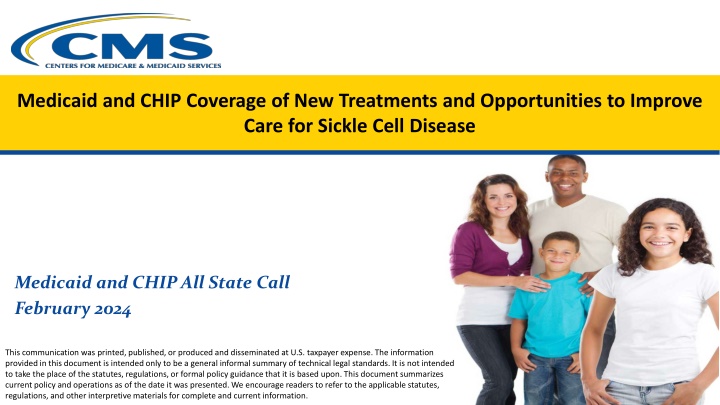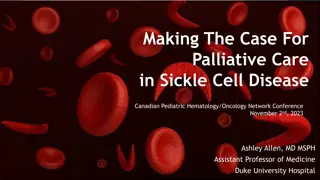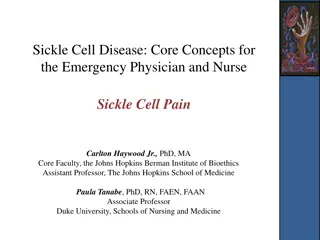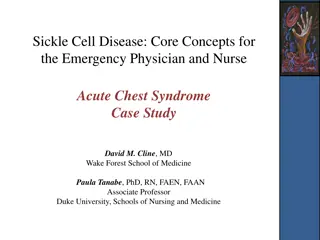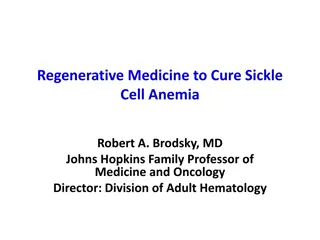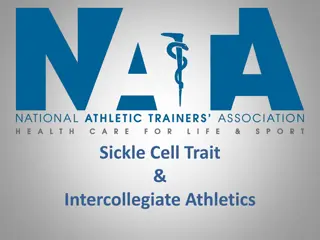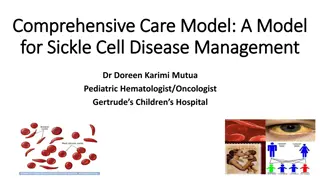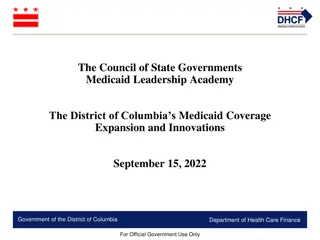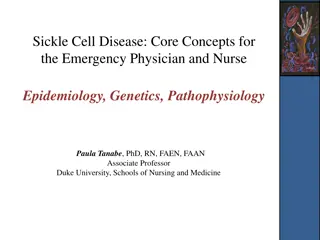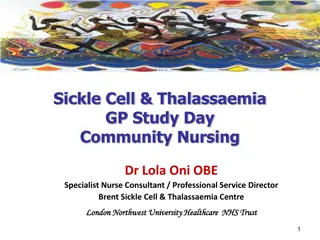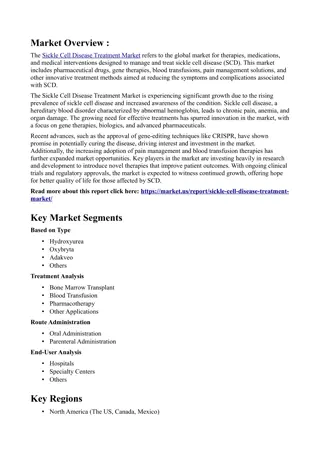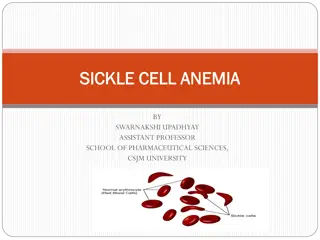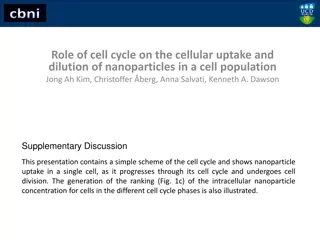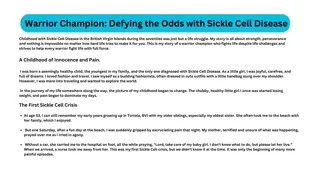Medicaid and CHIP Coverage of New Treatments for Sickle Cell Disease
This communication highlights the Medicaid and Children's Health Insurance Program (CHIP) coverage of new treatments for Sickle Cell Disease (SCD), focusing on the approval of milestone gene therapies, Casgevy and Lyfgenia. It discusses the commitment of CMS to improving healthcare access, quality, and experience for individuals with SCD enrolled in Medicaid, along with the coverage of gene therapy drugs under Medicaid. The document also provides essential statistics and links for more detailed information.
Download Presentation

Please find below an Image/Link to download the presentation.
The content on the website is provided AS IS for your information and personal use only. It may not be sold, licensed, or shared on other websites without obtaining consent from the author.If you encounter any issues during the download, it is possible that the publisher has removed the file from their server.
You are allowed to download the files provided on this website for personal or commercial use, subject to the condition that they are used lawfully. All files are the property of their respective owners.
The content on the website is provided AS IS for your information and personal use only. It may not be sold, licensed, or shared on other websites without obtaining consent from the author.
E N D
Presentation Transcript
Medicaid and CHIP Coverage of New Treatments and Opportunities to Improve Care for Sickle Cell Disease Medicaid and CHIP All State Call February 2024 This communication was printed, published, or produced and disseminated at U.S. taxpayer expense. The information provided in this document is intended only to be a general informal summary of technical legal standards. It is not intended to take the place of the statutes, regulations, or formal policy guidance that it is based upon. This document summarizes current policy and operations as of the date it was presented. We encourage readers to refer to the applicable statutes, regulations, and other interpretive materials for complete and current information.
Sickle Cell Disease in Medicaid CMS is committed to improving access, quality, and experience of health care for individuals living with sickle cell disease (SCD). Approximately half of people nationwide affected by sickle cell disease (SCD) are enrolled in Medicaid.1 Individuals with SCD may experience significant pain and other serious medical problems, such as infection, lung problems, stroke, and pregnancy complications. 2 In 2017, 78% of Medicaid and Children s Health Insurance Program (CHIP) beneficiaries with SCD had an emergency department visit, and 49% had at least 1 inpatient hospital stay. 2 1 https://www.cms.gov/files/document/sickle-cell-disease-action-plan.pdf 2 https://www.medicaid.gov/sites/default/files/2020-09/sickle-cell-disease-infographic.pdf 2
New Treatment Options for Sickle Cell Disease On December 8, 2023, the Food and Drug Administration approved two milestone treatments, the first cell-based gene therapies for SCD. Casgevy and Lyfgenia are both approved for the treatment of SCD in patients 12 years of age and older with a history of vaso-occlusive crises3 Of 31 patients treated with Casgevy, 93.5% were free from severe vaso-occlusive crises for at least 12 months during the 24-month follow-up period. Of 32 patients treated with Lyfgenia, 88% had complete resolution of vaso-occlusive events between 6 and 18 months after infusion. These products are made from the patients own blood stem cells, which are modified and given back in a single infusion as part of a hematopoietic stem cell transplant. Prior to treatment, the patient undergoes myeloablative conditioning with high-dose chemotherapy 3 For more specific information, see: https://www.fda.gov/news-events/press-announcements/fda-approves-first-gene-therapies-treat-patients-sickle-cell-disease 3
Medicaid Coverage of Gene Therapy Drug Outpatient prescription drug coverage is an optional benefit that all state Medicaid agencies currently provider under the Medicaid statute (section 1905(a)(12) of the Social Security Act). State Medicaid agencies that provide outpatient prescription drug coverage are required to cover all covered outpatient drugs offered by any manufacturer that agrees to provide rebates. Drugs that are administered in an inpatient hospital setting are considered covered outpatient drugs if they are directly reimbursed. As both Casgevy and Lyfgenia are expected to be administered in inpatient settings, they may therefore be covered outpatient drugs and subject to Medicaid rebates, if they are directly reimbursed. States have discretion to establish certain utilization controls such as prior authorization. 4
Separate CHIP Coverage of Gene Therapy Drug Prescription drugs are an optional benefit states may cover in a separate CHIP. Unlike Medicaid, separate CHIPs that cover prescription drugs are not required to cover all covered outpatient drugs offered by manufacturers that agree to provider rebates. Separate CHIPs are not included in the Medicaid Drug Rebate Program, so this requirement does not apply to separate CHIPs. States have the option to seek rebates from manufacturers for prescription drugs covered in separate CHIPs, but they are not best price exempt. Therefore, states have the option to cover both Casgevy and Lyfgenia and states may establish utilization controls. 5
State Opportunities in Value-Based Purchasing We encourage states to explore innovative contracting arrangements with willing manufacturers.4 For example, several states have received CMS approval to enter into value-based purchasing (VBP) supplemental rebate agreements with manufacturers. Such arrangements are intended to allow states to collect supplemental rebates for certain drugs when linked to an observed or expected therapeutic or clinical value in a select population. States that have not yet done so may obtain CMS approval through a State Plan Amendment (SPA) to enable states and willing manufacturers to enter into such agreements. Alternatively, manufacturers may offer a VBP arrangement to all states, even those states without an approved SPA, if they want to report varying best price amounts 4https://www.medicaid.gov/sites/default/files/2022-03/state-rel-189-vbp.pdf 6
Services Related to Gene Therapy The process for gene therapy includes: Evaluation for gene therapy Preparation during which patients may have changes in medications and transfusion therapy Aphresis for cell harvesting Chemotherapy and then infusion, both in an inpatient setting Follow-up care and monitoring Federal law outlines mandatory Medicaid and CHIP benefits, which states are required to provide, and optional benefits that states may cover if they choose. Examples of mandatory Medicaid benefits include inpatient hospital services, laboratory and X-ray services, physician services, and family planning services. Examples of mandatory CHIP benefits include well-baby and well-child visits, mental health and substance use disorder prevention, and age-appropriate vaccines. 7
Access to Out-of-State Providers in Medicaid Some beneficiaries will require access to out-of-state providers. In accordance with 42 CFR 431.52(b)(3), if a state determines, on the basis of medical advice, that needed medical services are more readily available in another state (for example, if there are no in- state SCD gene therapy providers), then the state must pay for services from the out-of-state provider. Note: All applicable provider enrollment requirements must be followed. While there are no similar requirements for separate CHIPs, states may provide access to out-of-state providers through the access to care assurances in the CHIP state plan as described at 42 CFR 457.495(c). The Medicaid transportation assurance is a requirement to make certain that every Medicaid beneficiary who has no other means of transportation has access to transportation needed to receive covered care.5 This also includes related travel expenses such as the cost of travel, lodging, and meals for beneficiaries and their caregivers as necessary for the beneficiary to receive the covered service. This requirement generally does not apply to separate CHIPs, except for those that provide the Early and Periodic Screening, Diagnostic, and Treatment (EPSDT) benefit consistent with Medicaid requirements. 5For information, please see the Medicaid Transportation Coverage Guide. 8
Medicaid Optional Benefit for Sickle Cell Disease (1/2) The American Jobs Creation Act of 2004 created an optional Medicaid SCD benefit under which States can cover additional services that might not otherwise be covered in the state plan.6 Under the optional SCD benefit, states may add new optional benefits (such as genetic counseling) for individuals with SCD or increase the rates at which they pay for mandatory or already covered optional benefits. As determined by the state, services may be provided via telehealth. While the American Jobs Creation Act of 2004 did not extend these options to separate CHIPs, states may elect to add SCD services as a covered benefit in separate CHIP. 6 See SMDL 05-003 for additional information. 9
Medicaid Optional Benefit for Sickle Cell Disease (2/2) Using this optional benefit, states may pay for SCD services at a different rate than they pay for similar services provided to individuals with other diseases.7 For example, under this benefit, if a state wanted to increase payment rates for SCD blood transfusions, it could do so through rate setting for the SCD benefit without having to increase payment for all Medicaid blood transfusions. Payment levels, however, must still be set within Federal requirements, including under section 1902(a)(30)(A) of the Act. States may also use this benefit to establish different coverage limits for SCD services under Federal amount, duration, and scope provisions at 42 CFR section 440.230 from those that apply to services in other benefit categories in section 1905(a) of the Act. Federal match may be available for Medicaid administrative expenditures related to activities, including certain educational activities, that promote Medicaid awareness and access to SCD, consistent with 1903(a)(3)(E) of the Social Security Act. 7 See SMDL 05-003 for additional information. 10
Innovation Center: Cell and Gene Therapy (CGT) Access Model The CGT Access Model is a voluntary model for states and manufacturers that tests whether a CMS- led approach to developing and administering outcomes-based agreements for cell and gene therapies improves Medicaid beneficiaries access to innovative treatment, improves their health outcomes, and reduces health care costs and burdens to state Medicaid programs.8 CMS and pharmaceutical manufacturers negotiate a set of key terms, which would include pricing (that is reflective of rebates paid by the manufacturer) and outcome measures that would form the basis for individual contracts between the manufacturer and participating states. State Medicaid agencies decide whether to sign the negotiated contract. If agreed, manufacturers will be obligated to provide states with supplemental rebates that reflect model-negotiated terms. In turn, states will be obligated to implement an agreed-upon standard access policy. CMS will provide support through technical assistance and funding to participating states. 8 See SMDL 05-003 for additional information. 11
Opportunities to Improve Care in SCD States have opportunities to improve the care of children and adults with SCD. Data show that gaps in recommended care for Medicaid and CHIP beneficiaries with SCD, specifically in rates of transcranial doppler ultrasound screening and pneumococcal vaccination for children, and in rates of hydroxyurea use among children and adults in 2017. The CMCS Quality Improvement (QI) Program provides state Medicaid and CHIP QI partners with information, tools, and expert support. Technical assistance is available to help states build QI knowledge and skills, develop QI projects, and implement, spread, and scale-up QI initiatives. Please contact MedicaidCHIPQI@cms.hhs.gov Infographic available at https://www.medicaid.gov/medicaid/quality- of-care/downloads/sickle-cell-disease-infographic.pdf For additional information on the CMCS QI program, see https://www.medicaid.gov/medicaid/quality-of-care/quality-improvement-initiatives/index.html 12
Questions 13
